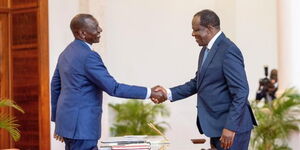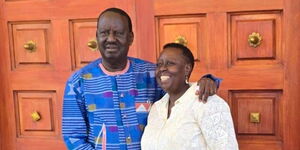Music Copyright Society of Kenya (MCSK) CEO Ezekiel Mutua now claims that his plan to distribute Ksh20 million royalty to artists was ratified by Gender Cabinet Secretary Aisha Jumwa.
Mutua whom the Kenya Copyrights Board (KECOBO) accused of shortchanging artists was thus dismayed by the exposé released on Thursday by KECOBO chair and former Cherangany MP, Joshua Kutuny.
KECOBO is a State Corporation mandated with the administration and enforcement of copyright and related rights. It comprises three organisations, MCSK, Kenya Association of Music Producers (KAMP) and Performers Rights Society Of Kenya (PRISK).
In his defence, Mutua further argued that before kicking off the 3-month distribution exercise, MCSK published criteria for distribution via a notice dated January 19, 2024, and invited public feedback on the process. No complaints were raised to oppose the process, according to the embattled CEO.
"Since the distribution started, we have received positive responses from our members who have been engaging us online and others on social media. Many artists have visited our offices to update their catalogues and are getting their dues in line with MCSK distribution rules," read the letter in part.
"It's imperative to note that the MCSK Royalties Distribution Notice published in the dailies on January 19 (way before the distribution began) was done after consultations with the CS in charge of Gender, the Arts, Culture and Heritage, Hon. Aisha Jumwa, the KECOBO and relevant stakeholders. The notice stated clearly that the monies available for distribution for Quarter One of 2024 was Twenty Million Kenya Shillings (Ksh20,000,000)."
KECOBO, in a five-page missive, had called out the three organisations, among them MCSK, accusing them of paying less than a third of all royalty collections (estimated at Ksh249 million) to artists and embezzling the rest.
The board, as a result, invited the Ethics and Anti-Corruption Commission (EACC) to launch a probe into MCSK's activities as well as those of other Collective Management Organisations (CMOs), KAMP and PRISK.
Mutua, in his latest letter, however, refuted claims that the amount had been collected and 70 per cent of the funds was to be distributed to artists.
"Where did the Kenya Copyright Board get the amounts they claim to base on what he calls the '70% rule?' Where is the 70% rule in the Copyright Act, in the regulation or Constitution?" He posed.
"MCSK takes a very serious view of the wild allegations by KECOBO, which are clearly meant to incite unsuspecting members to think that they have been short-changed. The Board has instructed our lawyers to take up the matter and bring this deliberate misinformation to an end. We assure the culprits that we shall meet in court."
According to the board, the three organisations ought to have distributed Ksh173 million representing 70 percent of the collected revenues.
In accompanying data, KECOBO revealed that the highest earner Rehema Lugose pocketed Ksh757,092, a figure lower than Ksh4.540,000 she was entitled to while the second, Reuben Kigame, received Ksh122,410 from Ksh734,460.












